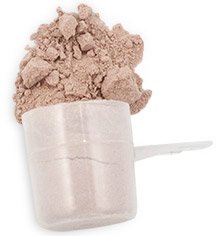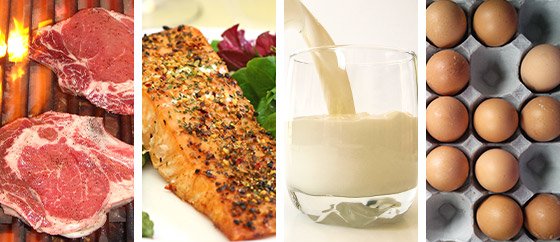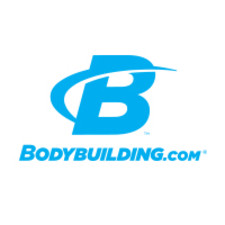Whether you're looking to build bigger muscles or just want to better your health, protein is a major player in your nutritional game. The oft-used excuse that this macronutrient is just for people looking to get swole needs to go, because the cold hard facts say that without adequate protein, fitness and general well-being could suffer. Quite simply, protein provides the foundation upon which your muscle tissues are built. Losing fat (ergo, maintaining muscle) and building new muscle rely upon meeting your individual protein needs.
That said, there's a lot of confusion surrounding this powerhouse nutrient. It can be difficult to know how much protein you need, which sources are best, and how much protein you can eat at once. Get your notepad ready! We've got answers to 10 of your most burning questions regarding this mighty macronutrient.
1. Is It True The Body Can Only Use 30 Grams Of Protein At Once?

A popular public opinion seems to be that the body can only process a certain amount of protein per meal, as if there's a magic number inside your belly that tracks protein intake. This is not entirely true. While I wouldn't recommend eating 100 grams of protein at every meal, the body will process whatever you feed it, albeit not always optimally.
You're going to digest all the protein you eat, but more isn't always better. Once you turn on protein synthesis and initiate the muscle-building process, you can't turn it on "more" in one meal.
Roughly 30 grams of protein per meal across multiple meals will actually help you boost protein synthesis many times over the course of a day. It will probably be easier on your digestive system, too!
2. Will More Protein Help Me Build Muscle Faster?
Yes, but only to some degree. Not all dietary protein you eat goes toward protein synthesis. Once you eat enough protein to drive protein synthesis, your body will oxidize protein for energy. Driving your protein intake far beyond the realm of 30-35 percent of your daily calories probably won't provide additional muscle-building benefits, but it will cut into your fat and carbohydrate intake, which may actually hinder your goals. This isn't exact, but eating at least 1 gram of protein per pound per day should cover your bases.

"This isn't exact, but eating at least 1 gram of protein per pound per day should cover your bases."
3. Can I Gain Fat From Eating Too Much Protein?
If protein is a building block for muscle, then you will never gain fat from overeating protein, right? Sorry, Timmy, but the weight can definitely creep on if your caloric equation shifts toward a surplus. While it is harder for protein to convert into fat than its other macronutrient buddies, if you eat way more than your body needs—no matter what it is—the excess could go into fat deposits. Plus, as your protein intake goes up, protein oxidation increases, which means you'll burn fewer carbs or fats for fuel.
4. What's The Best Protein Source?
This is a complicated question! Let's start with complete proteins. A complete protein is a protein source that contains adequate amounts of all nine essential amino acids, which are deemed "essential" because your body can't make them on its own. Most animal protein sources—like meat, fish, milk, eggs, and poultry—are complete. These are great protein sources because they're highly bio-available and contain all the building blocks your body needs.

"These are great protein sources because they're highly bio-available and contain all the building blocks your body needs."
Beyond that, protein quality is measured in a variety of ways, including biological value, net protein utilization, and the Protein Digestibility Corrected Amino Acids Score (PDCAAS). The PDCAAS test is the FDA's preferred method of determining protein quality. A PDCAAS value of 1 is the best possible score. Casein, whey, egg white, and soy protein all fall into this category, so they're all stellar protein sources.
5. Will Protein Powder Become Denatured If It's Cooked?

{{caption}}
Denaturing is the process by which proteins essentially "unfold" and lose biological function. Typically, proteins can withstand a certain temperature before this happens. This nugget of truth has led folks to believe that incorporating protein powders into homemade recipes—such as protein bars, muffins, or other baked food—and cooking them will denature the proteins, rendering them ineffective.
Yes, the protein does get altered from the cooking heat, but the body will absorb the constituent amino acids just the same. The nutritional value remains constant, as well. In this regard, cooking protein powder is no different than cooking a piece of chicken, and who would want to eat raw chicken? You may now let out a sigh of relief and continue your regularly scheduled protein bake session.
6. Will Following A High Protein Diet Impact My Bone Health?
An oft-referenced study showed a correlation between a person with a high intake of animal protein—more than 0.8 grams of protein per kilogram of bodyweight—and increased urinary loss of calcium. This calcium loss would suggest a decrease in overall bone health and density, but this study could not find evidence that the calcium came from bone. Furthermore, the researchers say that high intake of protein in the long-term actually increases bone mineral density, especially in an older population.

"You need to counterbalance the supposed detrimental effects of protein by eating a varied diet rich with fruits, vegetables, and other foods."
Of course, I'm not saying you should only eat protein. You need to counterbalance the supposed detrimental effects of protein by eating a varied diet rich with fruits, vegetables, and other foods. Even if protein is the backbone of your diet, you need to build a solid nutritional body around varied whole foods.
7. Will A Higher Protein Diet Harm My Kidneys?
According to a study published in the "American Journal of Kidney Disease," anyone who is currently suffering from chronic kidney disease should avoid high-protein diets. For otherwise healthy folk, your high protein intake should not pose a threat to your kidneys; make sure to keep your total daily protein consumption reasonable and consume sufficient water to counteract the water loss. Check with your doctor first if you are concerned about this.
8. Is There Anything Beyond Exercise That Increases My Protein Requirement?
A period of heavy caloric restriction will increase your need for protein. People who are under great stress, such as people recovering from illness or a serious injury, will also need a bump in protein consumption. As you lower your total caloric intake, there is a greater chance that incoming protein will be used as a fuel source rather than for muscle-building. On a low-calorie diet, it's even more critical that you eat at least 1 gram of protein per pound daily to maintain muscle mass.
9. Is Real Food Better Than Protein Powder?
Well, that's really up to you. While it's definitely not encouraged to source all your protein from a tub of powder, both protein supplements and whole foods have their place in your diet. Whey protein powder is highly convenient, offers immune-boosting benefits, and can be digested rapidly post-workout.
On the other hand, whole foods provide an array of additional nutrients and important micronutrients, such as zinc, magnesium, and iron. Plus, there's just something more satisfying and satiating about ravenously tearing into a piece of pork tenderloin versus gulping down another shake.

"Whole foods provide an array of additional nutrients and important micronutrients, such as zinc, magnesium, and iron."
BPI co-founder and vice president James Grage suggests trying a variety of protein sources and assessing how they impact your own body over time. "I believe that success comes from making small, measurable and calculated changes," he says. "I adjust, execute, track, adjust and repeat. I don't make giant radical changes in my diet regardless of what my goal is. Know the foods you eat and how your body reacts to those foods."
James believes in augmenting his diet with quality whey protein rather than leaning too heavily on any single source. "I usually lean toward Vanilla Caramel Whey-HD," he says. "It tastes great and is low in both sugar and fat."
10. Who Needs More Protein: Weight Lifters Or Endurance Athletes?
It's easy to assume that, since weightlifters aim to build strength and muscle, they have a greater need for protein than endurance athletes. This is one of those questions that's best answered on a case-by-case basis. On one hand, endurance athletes who train heavy for hours on end may require more protein simply because their energy needs are so high. This would be especially true if they are keen on losing fat. On the other hand, competitive lifters like people in strongman competitions need extraordinary amount of calories and protein.

The bottom line is simply that protein is an incredibly important nutrient, especially for active individuals with clear fitness goals. If that describes you, then it's probably time for a steak or a shake!
References
- Barzel, U. & Massey, L. (1998). Excess Dietary Protein Can Adversely Affect Bone Health. The Journal Of Nutrition. Vol. 128, No. 6. Pp. 1051-1053.
- Friedman, A.N. (2004) High Protein Diets: Potential effects on the kidney in renal health and disease. American Journal Of Kidney Disease. Vol. 44, Issue 6. Pp. 950-962.

